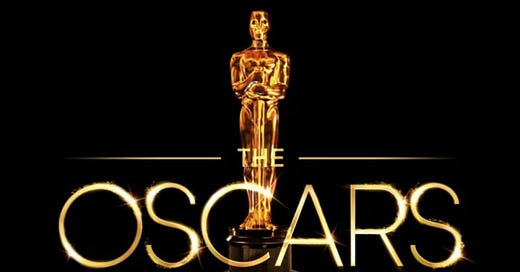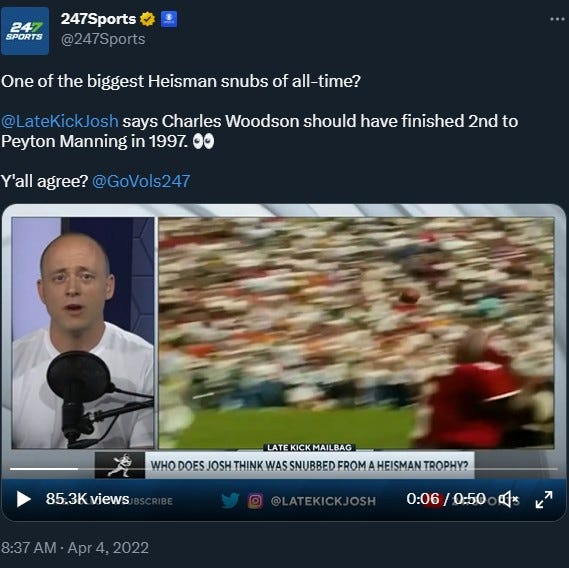The Academy Awards, The NBA MVP & Heisman, and Failing to Appreciate Greatness
Tonight marks the 95th edition of the Academy Awards, an annual celebration for the best in filmmaking.
I enjoy the Oscars if, for no other reason, than the ceremony and its weeks of build-up provide a watch guide for movies I may not otherwise seek out. I also appreciate remarkably talented people being recognized for their work, which — at the risk of coming across naive or overly idealistic — has cultural importance.
Movies have the capacity to educate, inspire and enlighten while entertaining audiences. A trip to the theater can be an unrivaled bonding experience. My family’s first outing after receiving COVID-19 vaccination in 2021 was to the local Cinepolis for a showing of Spirit Untamed. It’s a memory I’ll always cherish.
With this in mind, Entertainment Weekly’s anonymous Oscar-voter article this week contributed to my growing souring on awards ceremonies. The bitter, mean-spirited nature of the responses revealed the chasm in how those actually involved in the Academy Awards view cinema vs. how I see it, and that’s a little bit heartbreaking.
My view of the Oscars parallels my ever-diminishing enjoyment of certain awards in sports, most notably the Heisman Trophy and the NBA Most Valuable Player Award.
Both honors’ histories fascinate me. They tell the story of the sport. And, increasingly, the story of modern times is one of rigid, monolithic thinking and meanness that loses perspective as to why people fall in love with games.
The Heisman’s arc in the 21st Century is ironic. As we gain unprecedented ability to witness games from around the country, at all levels of college football, and have more access to information than ever before, the Heisman has become increasingly homogeneous.
An award already largely monopolized by quarterbacks and running backs, the Heisman has devolved in the last 25 years to be an award almost exclusively for quarterbacks from Power Five conferences.
And that applies as much to finalists as winners. A modern-day parallel to BYU quarterback Ty Detmer winning the Heisman is impossible in part because there isn’t access for a Detmer equivalent.
In the Playoff era, there hasn’t been a finalist from outside the Power Five — not Rashaad Penny in his near-historic 2017 for San Diego State; not Darrell Henderson averaging damn near a first down every time he touched the ball for Memphis; not Grayson McCall in the COVID-impacted 2020 campaign.
And that’s to say nothing for the pre-internet days when the finalists included Holy Cross’ Gordie Lockbaum or Steve McNair at Alcorn State. Despite having more opportunity to see the exploits of such players today, there’s somehow less discussion of such outliers. It’s gotten so bad and myopic, even Power Five players with seeming slam-dunk candidacies to at least reach New York, like Kyle Pitts for Florida in ‘20, are overlooked.
Hell, the conversation around the Heisman has become so hostile and demanding lock-step thinking, we’ve gone so far as to relitigate past non-traditional Heisman winners for content.
No award’s past is more regularly relitigated, however, than that of the NBA MVP.
Karl Malone beating out Allen Iverson in 1999, for example, remains a sore spot for plenty of hoopheads (me). Likewise, Steve Nash finishing with more MVPs than Shaq or Kobe remains a point of contention nearly two decades later.
And then there are people who will argue LeBron should have more than his four. And it’s a worthwhile argument!
MVP is an incredibly subjective award, which is part of the fun of debating. The word Valuable and the observer’s definition of value leads to wildly divergent interpretations of who deserves to win — ergo Nash winning two with thin Phoenix Suns teams and Shaq and Kobe being penalized for playing together (and later, Dwyane Wade and Pau Gasol).
In much the same way the Academy Awards recognize Best Picture as well as Best Screenplay, I’ve long been an advocate for the NBA to award both Most Valuable Player and Most Outstanding Player. The current season’s debates about MVP have only steeled my resolve that this is the way that league should go.
I’ll preface the following by stating I have nothing against advanced metrics. I cite them quite often in my basketball writing because there’s real value in contextualizing the game.
Emphasis on contextualize.
Advanced metrics are not the game itself and should not be cited as infallible anymore than they shouldn’t be wholesale dismissed. NBA media leading the Most Valuable Player debate have lost the plot in that regard, as the march to a third consecutive Nikola Jokic MVP appears inevitable1.
Social media is to blame to some context, but there’s an air of nastiness around the award now, and the insistence that Jokic is an objectively clear MVP vs. a subjectively worthy candidate against equally worthy Joel Embiid or Giannis Antetokounmpo.
Much of the conversation I see or heard associated with this MVP race shares a tone of bitterness akin to the abovementioned EW article on Academy Awards voters.
In both cases, I’m left wondering…why do these people follow their chosen medium, whether it’s cinema or basketball?
Seriously. We as spectators are drawn to movies and to sports for the emotional spark they invoke in us. We become fans because we appreciate greatness, whether it’s the multifaceted process it takes to grow a story from concept to a product shown on screens to millions worldwide; or the greatness of an exceptionally skilled athlete honing their craft until their among the world’s very best.
Rewarding greatness isn’t the issue so much as a growing and pervasive cultural need to be “right.” It’s a dull, uninteresting and frankly depressing way of consuming entertainment.
I write this as someone who was relatively early on the Jokic bandwagon, having drawn parallels between the Nuggets star’s uncanny passing and ballhandling to stories I’d been told of Arvydas Sabonis.





